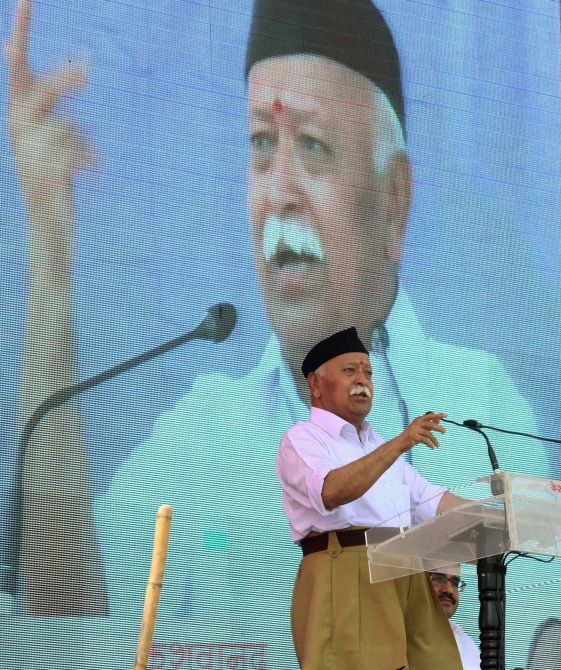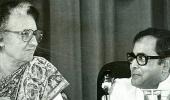'Unity in diversity is a dated notion as India, today, is more unified and cohesive and yet more pronouncedly diverse than ever in its history,' argues Shekhar Gupta.

While the Bharatiya Janata Party has ruled India in the past too, it is only now that the Rashtriya Swayamsevak Sangh chief's traditional Vijaya Dashmi day call to the faithful has become like a State of the Union Address.
It is because, unlike Atal Bihari Vajpayee's, this National Democratic Alliance is undoubtedly a government of the RSS. Which may not be a bad thing as it takes away the old excuse of tensions between New Delhi and Nagpur whenever the Jan Sangh/BJP have been in power at the Centre, either as constituents of a larger entity (Janata, 1977 to 1980) or a coalition leader (NDA, 1998 to 2004).
Now there are no alibis as Mr Vajpayee's government had, when many of his policies, particularly on the economy, were resisted by the RSS.
We haven't seen any such discordance since Narendra Modi rose to power. It is primarily because Mr Modi himself suffers from no hypocrisy over his belief in Hindutva. He also believes he was able to govern Gujarat brilliantly, so why should there be a problem at the Centre? His pitch to the RSS, therefore, is different from Mr Vajpayee's.
Mr Vajpayee gave RSS leaders then (mostly his old contemporaries) great personal respect and let BJP ministers and chief ministers help RSS leaders' favourites and family members get contracts, bank loans, deals, and ride the gravy train.
But his ties with the RSS and also its then chief K S Sudarshan were fraught with suspicion bordering on contempt. In private, Mr Vajpayee joked about RSS leaders, although never viciously and often lovingly. More in the sense of how you may sometimes mock old grandparents.
He let them mess with culture and human resource development, which he left under the charge of his friend and then RSS favourite, Murli Manohar Joshi (who, by the way, has a real doctorate in physics and was a tenured professor at Allahabad University).
But beyond that, key areas of economy, foreign policy, even the fight against terror and the way it affected relations with Pakistan were fully his domain. He led India through those perilous years, maintaining strategic restraint through Kargil and after the Parliament attack with magisterial panache.
The Sarsanghchalak's Dussehra speech made front pages still, but never had the importance it does now. This is why, in the changed situation now, those who complained about Doordarshan's live telecast of Mohan Bhagwat's Dussehra speech last year were wrong on an important count: News value. The new arrangement is a political reality.
The ideological underpinnings of the RSS are simple, if simplistic. Its founding fathers, Keshav Baliram Hedgewar and 'Guruji' M S Golwalkar, and to a lesser extent Vinayak Damodar Savarkar (he founded the idea of Hindutva nationalism, but was more nuanced and Westernised) believed in the global superiority of Indian (Hindu) culture, philosophy and science.
Golwalkar and Hedgewar talked about how those conquered by Western powers remained suppressed and miserable while those to whom we 'reached out' in the more distant 'past,' particularly in Southeast Asia, only benefited and still gratefully carry Hindu lifestyles and names -- even if some may have become Muslim later (Indonesia).
The West-phobia of the RSS is fascinatingly qualified. It rejects the West's values and suspects its motives, but also has a child-like obsession with impressing it. Swami Vivekananda became a real icon when he delivered his famous speech in Chicago and 'swept off their feet' his materially rich American audience trapped in spiritual poverty.
The Hindu Rashtra won't banish all minorities. RSS idealism would rebuild a nationalism on Hindutva that minorities happily embrace and start believing that they are happier in Hindustan (The RSS prefers 'Hindusthan') than in any Islamic or Christian country. This is the origin of the 'Kalam Standard' for the patriotism of Indian Muslims.
It follows that they must owe this to the big-heartedness of Hindutva, way more ancient than their faiths, than merely to Ambedkar's Constitution. Note that in the speech this year, Ambedkar is deified, almost like Bhagat Singh (a crimson-red Leftist). His rejection of Hinduism and embracing of Buddhism has been accepted and admired for how it followed deep analysis of 20 years. But there wasn't much said about his Constitution.
In essence, the RSS is in awe of the West's rise, but fears its cultural influence. It believes that philosophical winds should blow from east to west. Mr Modi, with his frequent public engagements on his foreign visits, fulfils that need. To an extent, the RSS old-guard would see him as a modern, jet-setting Vivekananda, powered by the Indian State and taking the good word around the world. Mr Vajpayee was ideologically confused, even a deserter.
RSS ideologues run into trouble when they also interpret the mandate of 2014 to mean that that it entitles them to bring about deeper cultural changes within India as well. The idea on which I would pick an argument with the Sarsanghchalak is that while learning to live with diversity, you could also homogenise Indian society.
His call for common laws, common policies that apply equally to all, is majoritarian, and unsustainable. His idea of 'population control' is outdated and loaded -- and tells you why, while most RSS people fought the Emergency, among a large section there was admiration for Sanjay Gandhi as he targeted Muslims with his sterilisation and slum clearance. Not surprisingly, his wife Maneka Gandhi and favourite bureaucrat Jagmohan (of Turkman Gate fame) subsequently became stars of the BJP. It won't even be a stretch to say that the same affinity led Sanjay's closest ally and loyalist Bansi Lal to also eventually join hands with the BJP.
The call for population 'control' is rooted not in data, but paranoia. There is no better way of controlling population, for any community, than education and prosperity. India's overall population growth rate (at about 1.4 per cent now) is falling more dramatically than anticipated and even Muslim growth is declining. It is all happening voluntarily, and happily, with rising incomes and, more importantly, girls going to school.
Over the decades, in fact, India's diversity has grown deeper, become more widespread and pronounced. Growing federalism is helping state leaders discover powers they never realised the Constitution had for them. They are also pushing to enlarge these.
So many states now, especially BJP-run states, are drafting their own labour and land laws because the Centre cannot pass enabling legislation. Peripheral states, from Kashmir to the Northeast, pass laws and set up governance norms to suit their own respective demographies and culture. Cow slaughter, for example, is an offence under Kashmir's own Ranbir Penal Code.
All these are making India stronger, not weaker. Any notion now that this can be reversed in a new unification is fantasy. There is no need therefore to seek unity in this diversity. It is a dated notion as India, today, is more unified and cohesive and yet more pronouncedly diverse than ever in its history.
I would, therefore, suggest that the Sarsanghchalak modernise two things in the RSS to make it relevant to modern India. One, of course, is its uniform, the 'ganvesh.' And second, its slogan, from unity-in-diversity to, simply, celebrate diversity.
IMAGE: RSS Sarsanghchalak Mohan Bhagwat at the Vijaya Dashmi event in Nagpur. Photograph: PTI












 © 2025
© 2025